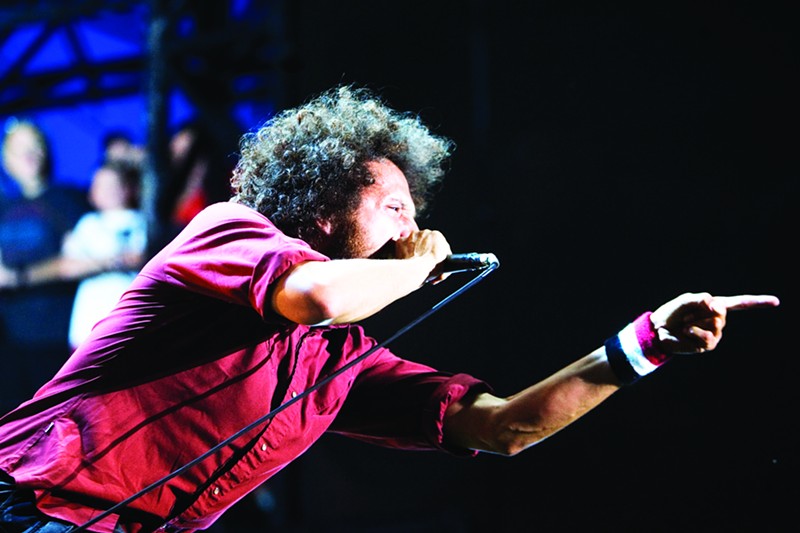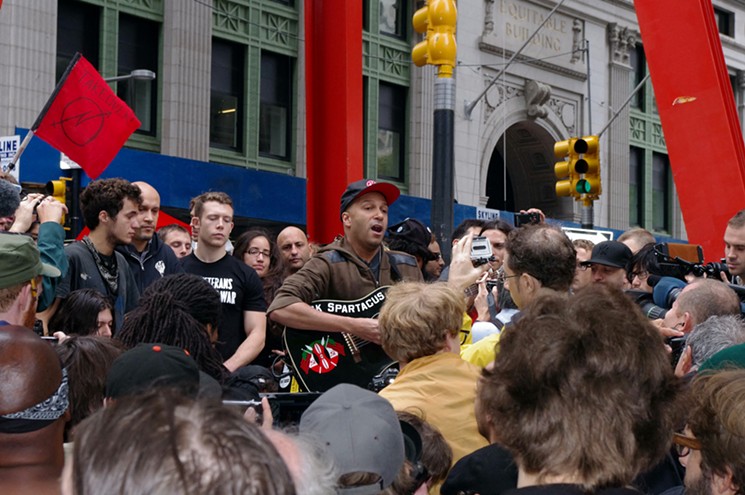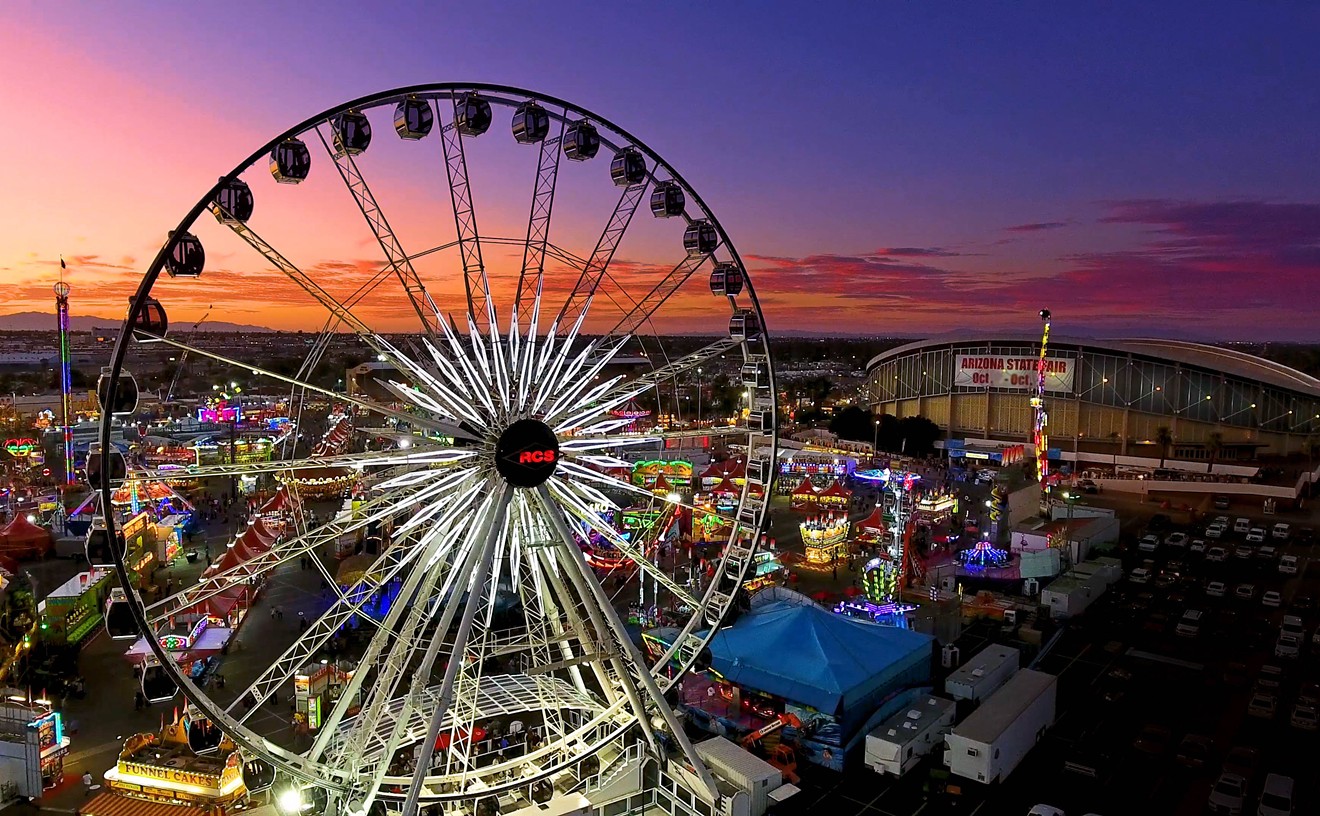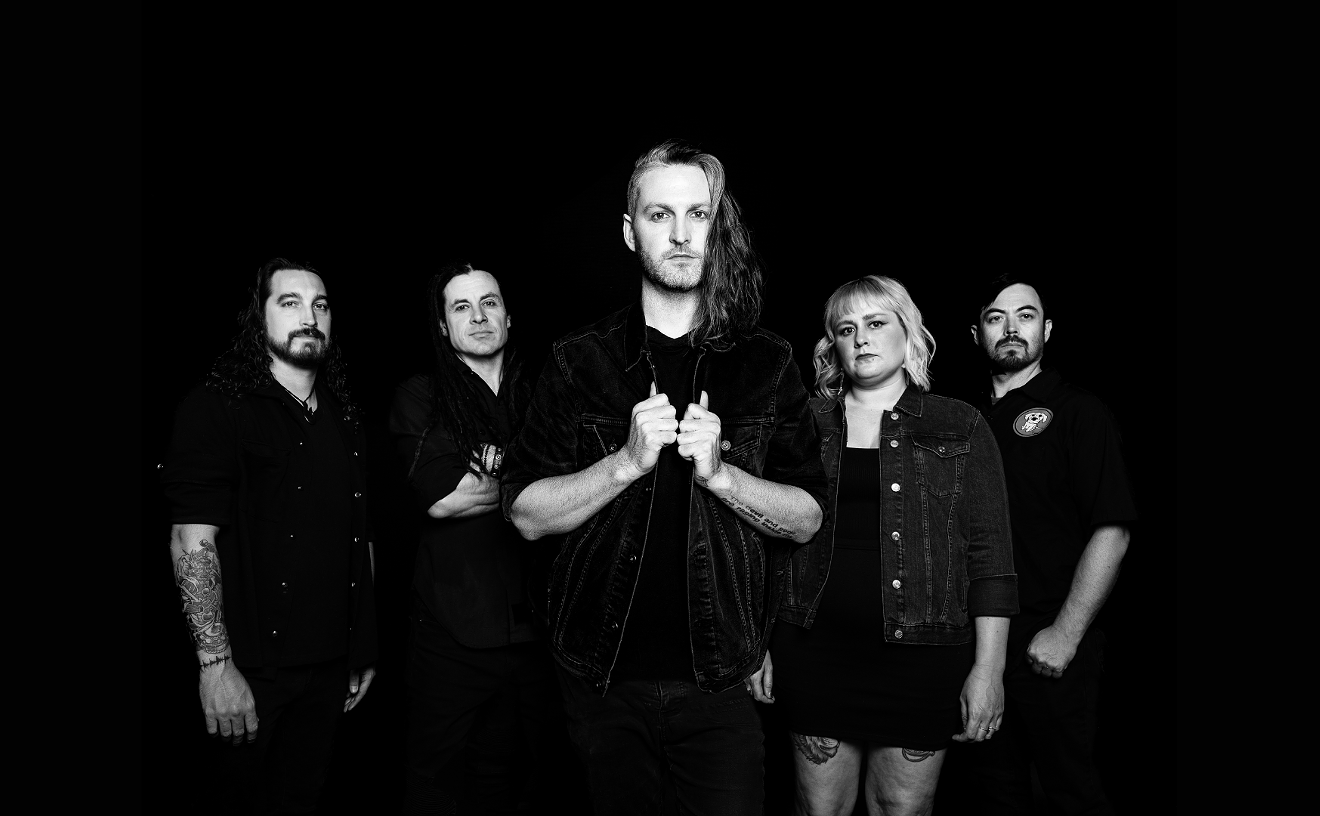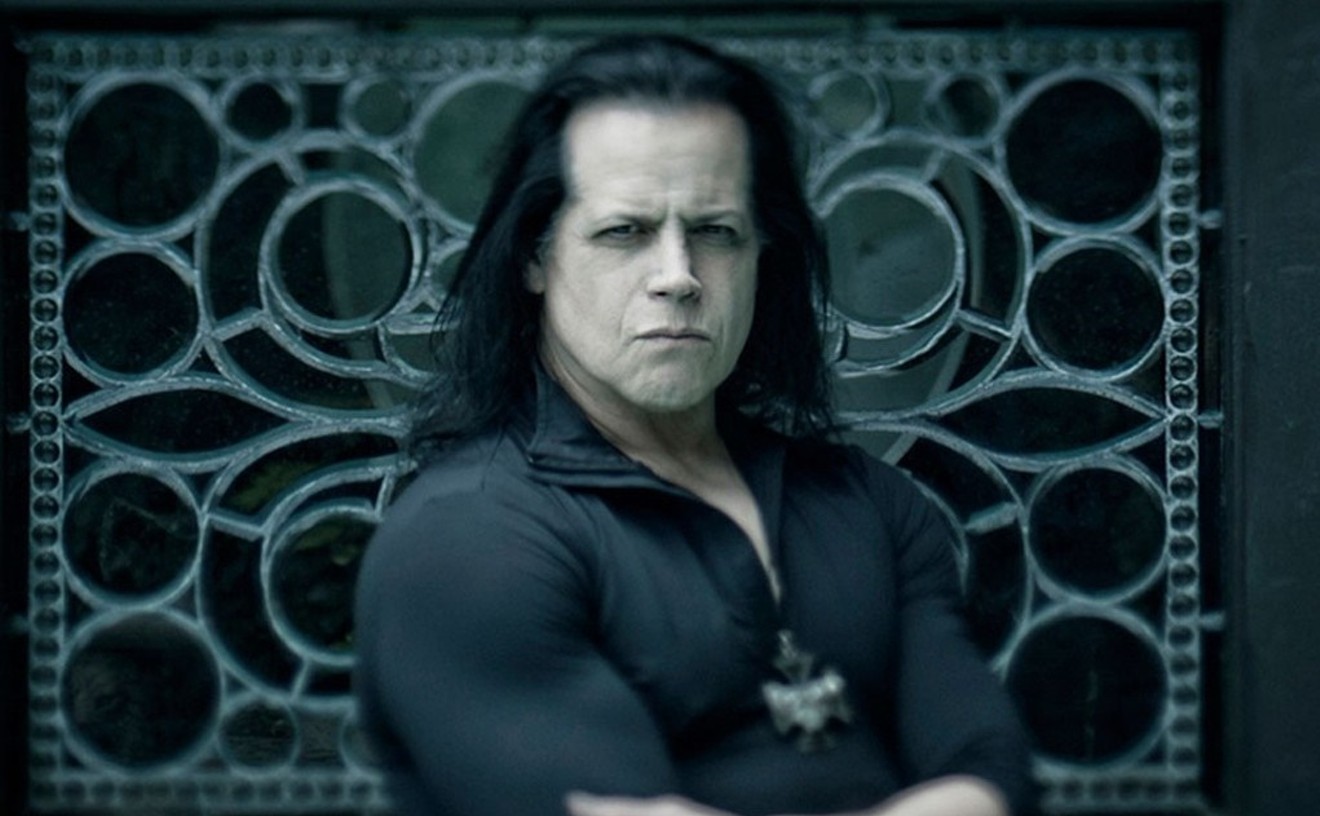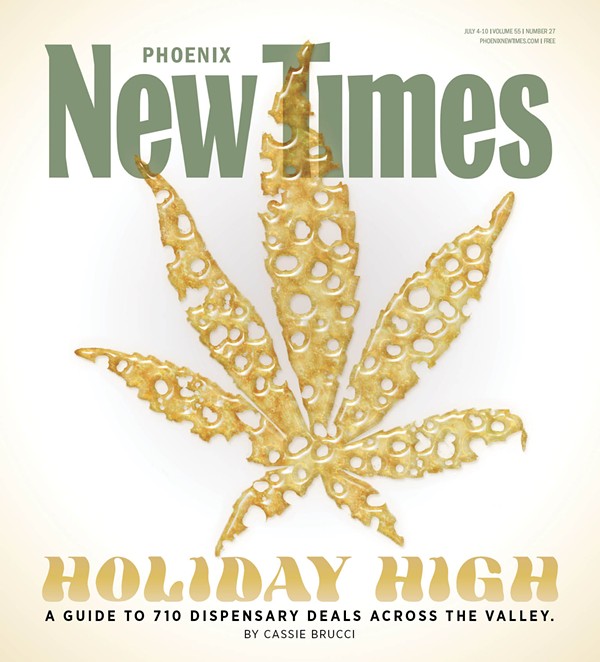(Editor's note: In light of Rage Against the Machine's Jan. 3, 2024, announcement that they would not tour again and have effectively disbanded, we're republishing this March 11, 2020, article about the band's strained relationship with the state of Arizona.)
This year promises some big moments in the world of rock music, and the most anticipated of them all might be the reunion of Rage Against the Machine. (Sorry, Motley Crue.)
The Los Angeles band will return to the stage for the first time in nearly a decade at Coachella 2020. They’ve also announced a summer’s worth of tour dates, the first four of which are in border states: El Paso, Texas; Las Cruces, New Mexico; and two here in the Valley, at Glendale’s Gila River Arena. All proceeds from these shows will be donated to immigrant rights organizations based in each of those cities.
With the 2020 presidential election looming, it’s hard not to see the band’s return as having a larger purpose. Rage’s performances and political activism long have gone hand-in-hand, most notably at their 2000 Democratic National Convention “free speech zone” performance. Six protesters were arrested after clashing with police officers after the concert.
Two months later, Rage Against the Machine called it quits.
The band’s anti-establishment aesthetic comes on like an assault, blasting out a righteous message: Anger over injustice is a powerful force. And Phoenix has often found itself in the crosshairs of Rage’s ... rage. The band and the state have a complicated relationship. Rage last played Phoenix in December 1999. A decade later, frontman Zack de la Rocha returned to Phoenix, taking to the streets alongside civil rights activist Salvador Reza and Maricopa County Supervisor Mary Rose Wilcox to lead thousands in protest over Joe Arpaio’s immigration abuses.
Then came SB 1070, the controversial 2010 bill that gave police officers broad powers to challenge anyone they assumed to be an illegal immigrant to prove their citizenship status. The bill also made it a state crime for legal immigrants to not carry registration papers and for undocumented people to solicit work.
After the signing of SB 1070, de la Rocha led a charge against the controversial immigration law with Sound Strike, an organization of musicians who refused to tour in Arizona until the bill was repealed. Sound Strike recruited dozens of artists, including Nine Inch Nails, Chris Rock, Kanye West, Sonic Youth, Massive Attack, Joe Satriani and My Morning Jacket. As an additional response, de la Rocha held a fundraiser in 2012 at the Hollywood Palladium in Los Angeles, and all proceeds went to organizations fighting against SB 1070.
“Fans of our music, our stories, our films, and our words can be pulled over and harassed every day because they are brown or black, or for the way they speak, or for the music they listen to,” de la Rocha wrote in an open letter to The Guardian, explaining the band’s position. “We are against this law because it is about racial profiling and makes an entire race of people suspects first, and people second,” Rage guitarist Tom Morello added to SPIN.com in 2010.
Not everybody agreed that boycotting Arizona was the most effective way for bands to express their opposition to the law, though. As a Phoenix New Times writer noted in 2011, “guys like [country singer] Trace Adkins, who actually sell a ton of tickets, get to come to town and talk about how great SB 1070 is while the opposition’s voices are silent.”
But Morello and de la Rocha took a historical view of things: “The economic boycott against Arizona was successful in getting them to pass Martin Luther King Jr.’s birthday — they were the last state in the union to do that,” Morello said. “It was successful in Arizona during the United Farm Workers and Cesar Chavez’s campaign against the grape-growers.”
Rage members’ perspectives were informed by their political pasts. As a young Harvard grad in the late ’80s, Morello took a break from playing the Hollywood music scene and got a job as California Senator Alan Cranston’s scheduling secretary.
“Despite the fact that [Cranston] had progressive views on the environment or immigration, he spent all day on the phone calling the wealthy and powerful, exchanging favors for campaign money,” he recalled in an Alternative Press cover story in 1996.
After Cranston’s career ended due to scandal, a jobless Morello headed to Orange County, where he met de la Rocha, an aspiring young poet. De la Rocha’s father was a co-founding artist of Los Four, an early Chicano muralist group whose work still pops up around L.A.
“Los Four intended on making sure that throughout their artwork, they could make our experiences tangible and also reestablish a part of our culture that had been lost,” de la Rocha told Alternative Press. “Pointing out that we aren’t a disposable community.”
Three years later, Rage Against the Machine practiced for the first time. In 1992, they wrote the single “Bullet in the Head.” For a certain kind of listener, they became the soundtrack to the tumultuous — though not so much by today’s standards — period between the Cold War and the War on Terror. They broke up before their songs could absorb the weight of the George W. Bush, post-9/11 era.
Almost every year since SB 1070 was passed, there’s been an effort to remove the bill from our history. The constitutionality of the law has been challenged many times, and parts have been struck down by courts. But the section known as the “show me your papers” provision still stands.
Ten years ago, a man named Martin Quezada chose to run for office after the bill was passed. In January 2020, the now-state Senator announced a proposal to remove the controversial bill entirely (this is the seventh year he’s tried). Quezada talks about the increased number of Latinos that began running for office — including himself — after SB 1070 and the activism, marches, and ups and downs that followed it.
“We knew this would be a marathon, not a sprint,” he told the Arizona Republic in a February 2020 article, ticking off the accomplishments against anti-immigration and discrimination over the past decade: turning the state purple, knocking Arpaio out of office, the Supreme Court ruling most of SB 1070 ruled unconstitutional, narrowing state legislature margins.
With all that in mind, it’s hard to think that Rage Against the Machine wouldn’t be proud to play Arizona again. Progress has been made over these past two decades. But there’s still a lot of work left to do.
[
{
"name": "Air - MediumRectangle - Inline Content - Mobile Display Size",
"component": "18478561",
"insertPoint": "2",
"requiredCountToDisplay": "2",
"watchElement": ".fdn-content-body",
"astAdList": [
{
"adType": "rectangle",
"displayTargets": "mobile"
}
]
},{
"name": "Editor Picks",
"component": "16759093",
"insertPoint": "4",
"requiredCountToDisplay": "1",
"watchElement": ".fdn-content-body",
"astAdList": [
{
"adType": "rectangle",
"displayTargets": "desktop|tablet"
},{
"adType": "rectangle",
"displayTargets": "desktop|tablet|mobile"
}
]
},{
"name": "Inline Links",
"component": "17980324",
"insertPoint": "8th",
"startingPoint": 8,
"requiredCountToDisplay": "7",
"maxInsertions": 25
},{
"name": "Air - MediumRectangle - Combo - Inline Content",
"component": "16759092",
"insertPoint": "8th",
"startingPoint": 8,
"requiredCountToDisplay": "7",
"maxInsertions": 25,
"watchElement": ".fdn-content-body",
"astAdList": [
{
"adType": "rectangle",
"displayTargets": "desktop|tablet"
},{
"adType": "rectangle",
"displayTargets": "desktop|tablet|mobile"
}
]
},{
"name": "Inline Links",
"component": "17980324",
"insertPoint": "8th",
"startingPoint": 12,
"requiredCountToDisplay": "11",
"maxInsertions": 24
},{
"name": "Air - Leaderboard Tower - Combo - Inline Content",
"component": "16759094",
"insertPoint": "8th",
"startingPoint": 12,
"requiredCountToDisplay": "11",
"maxInsertions": 24,
"watchElement": ".fdn-content-body",
"astAdList": [
{
"adType": "leaderboardInlineContent",
"displayTargets": "desktop|tablet"
},{
"adType": "tower",
"displayTargets": "mobile"
}
]
}
]

